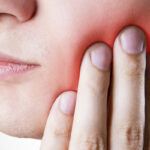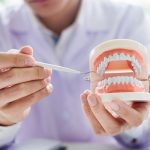Dentures are an incredible innovation that have changed so many lives since their introduction in 7th century BC. Not only do they bridge the aesthetically displeasing gaps left by missing teeth, but they are also good for the physical and mental health of elderly individuals.
Unfortunately, it’s too easy to forget that these artificial teeth need just as much upkeep as real human teeth. If you’ve got dentures, you know just how much of a difference they make; life is very different before and after dentures and the benefits they provide.
Here, then, are a few fundamental tips for maintaining oral health with dentures.
1. Take Care of Your Dentures
If you have dentures, it’s important to handle them with care. Attention to detail is essential. Here are a few ways to go about doing that:
- Clean your dentures daily, and don’t forget that brushing is a part of that process. Brush and rinse your dentures daily with a soft brush. Like natural teeth, dentures must be brushed daily to remove food and plaque. In between brushings, rinse your dentures after each meal
- Use a cleanser that is specifically made for dentures. Soap and dish detergent are far too abrasive for dentures; the same goes for toothpaste. Fortunately, ultrasonic cleansing devices can be used on dentures, which makes cleaning much easier and more efficient.
- Handle your dentures carefully and softly. Be sure you have a special place to keep them when not in use, so you don’t have to go searching for them. If you’d like to avoid accidentally shattering them on the ground during the cleaning process, you can stand over a folded towel or a full sink of water. Never expose your dentures to hot water, as it risks warping them.
- Store your dentures in a moist place. If the surrounding environment is too dry, they could lose their shape. Despite how dentures are represented in film and television, do not store your dentures in cleaning solution or water.
2. Replace Dentures or Make Repairs When Needed
There aren’t many follow-up appointments needed once you receive your dentures. The only time you’ll be visiting your denturist is to replace or repair them. Oral health care providers can usually make minor adjustments for you.
The longer you wear them, the more likely you will need to get your dentures rebased or relined, due to natural wear and tear, as well as changes related to the shape of your face and state of your jaw. The more you age, the more likely these changes will occur.
Fortunately, most dentures can last for up to 7 years if properly taken care of.
Avoid DIY (“do it yourself”) repair kits, however, as these can easily damage your dentures. Only let skilled professionals take on an important task like this.
3. Don’t Forget About the Health of Your Gums and Mouth
Just because they’re not natural teeth, doesn’t mean they can’t allow bacteria to fester. That’s why you always need to remember to brush your gums, palate, and tongue before you put your dentures in and after you take them out.
Doing so will eliminate excessive plaque while helping with blood circulation in the mouth.
Hopefully, these tips will become habitual for you and an integral part of your daily routine. If so, you’re on your way to healthier, happier life with dentures.








